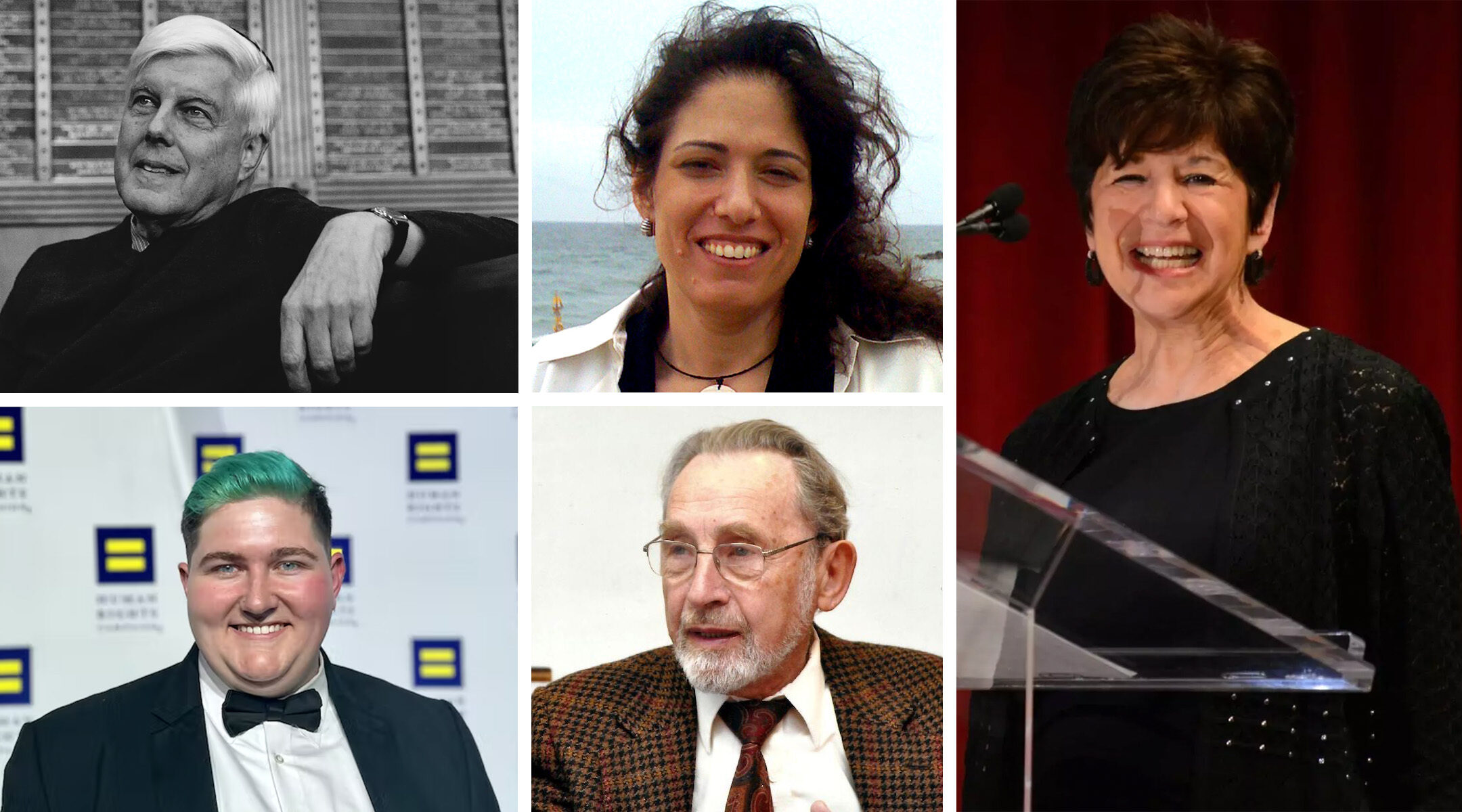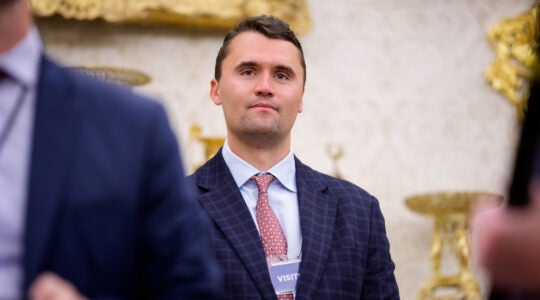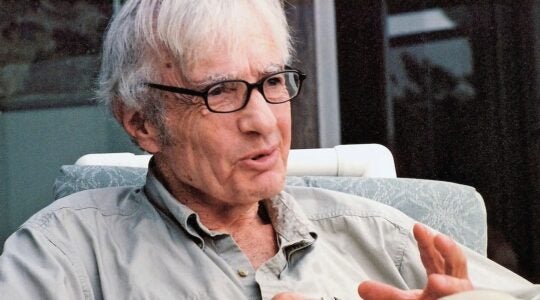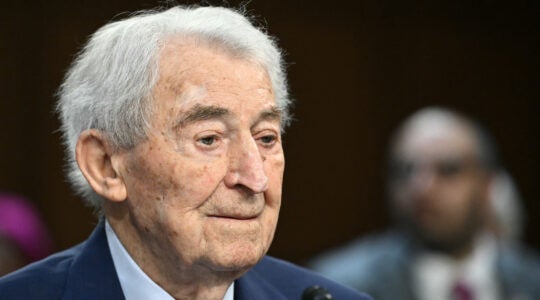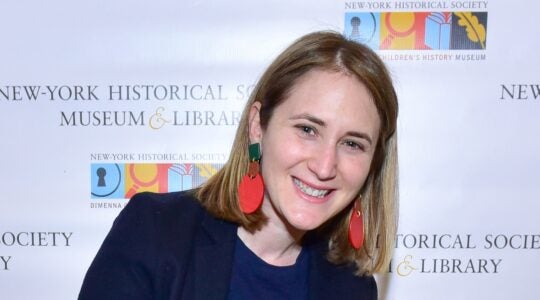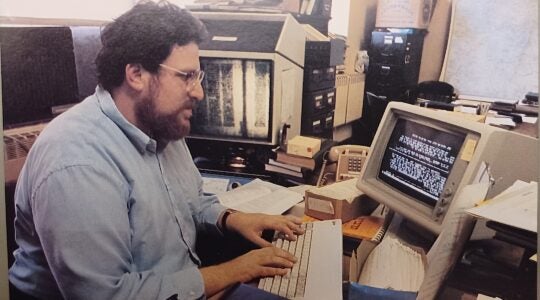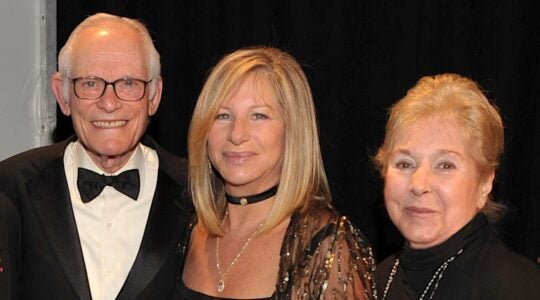(JTA) — All year long, the Jewish Telegraphic Agency reports about the deaths of Jewish newsmakers in our community. To close out the year, we wanted to turn our attention to people who may not have been such household names but whose stories deserve to be remembered.
Here, with the help of readers who shared the names of people they are remembering, we recall 18 Jews who shaped their local communities and made a difference in the lives of those close to them. They include rabbis whose impact extended for decades, teachers who inspired generations of students and activists who were working to build a better world. May their memories be a blessing.
Harriet Bograd
A champion of emerging Jewish communities in far-flung places.
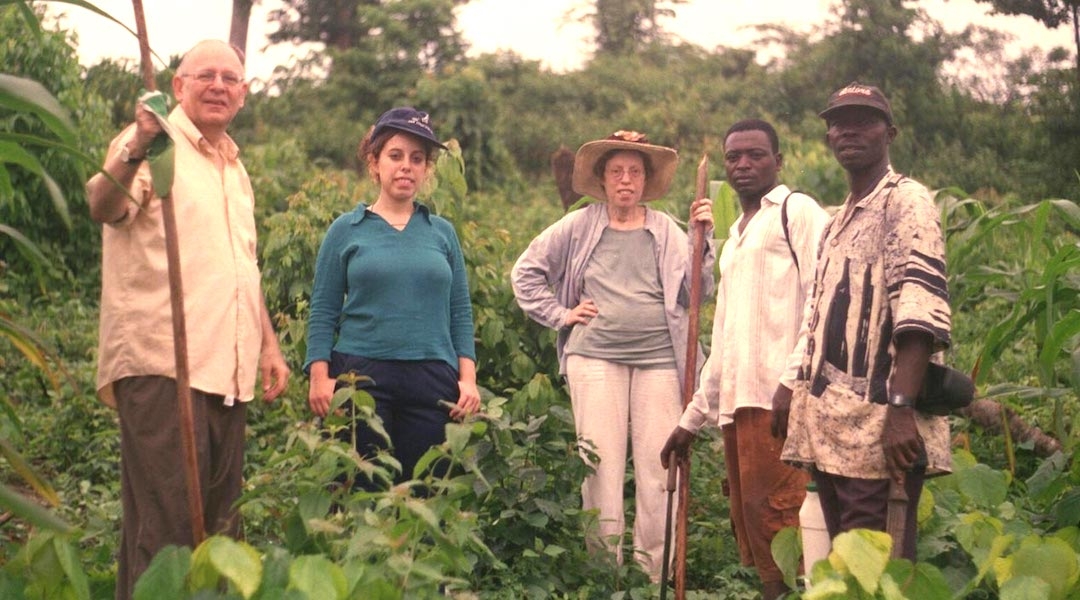
Harriet Bograd, center, her husband Ken Klein, left, and daughter Margie on a visit to the Sefwi Wiawso Jewish community in Ghana in an undated photo. (Courtesy Kulanu, Inc)
Harriet Bograd, who as president of the nonprofit Kulanu supported emerging Jewish communities in Africa, Asia and other places far beyond the usual centers of Jewish life, died on Sept. 17 in a Manhattan hospital. She was 79. A Yale-educated lawyer and a stalwart at the West End Synagogue, she was inspired by a visit in 2004 to a remote village in Ghana, where about two dozen families considered themselves Jewish. In the years to come, she and Kulanu would provide support to emerging Jewish communities in Uganda, Tanzania, Nigeria, Cameroon, Madagascar, Indonesia, Pakistan, Guatemala, the Philippines and more. She once said of her work at Kulanu, “after the Holocaust and the decimation of Jewish communities in Arab lands, the idea [is] that we’re establishing Jewish communities that have their own richness and variety.”
Henry Berg-Brousseau
Transgender activist from Kentucky
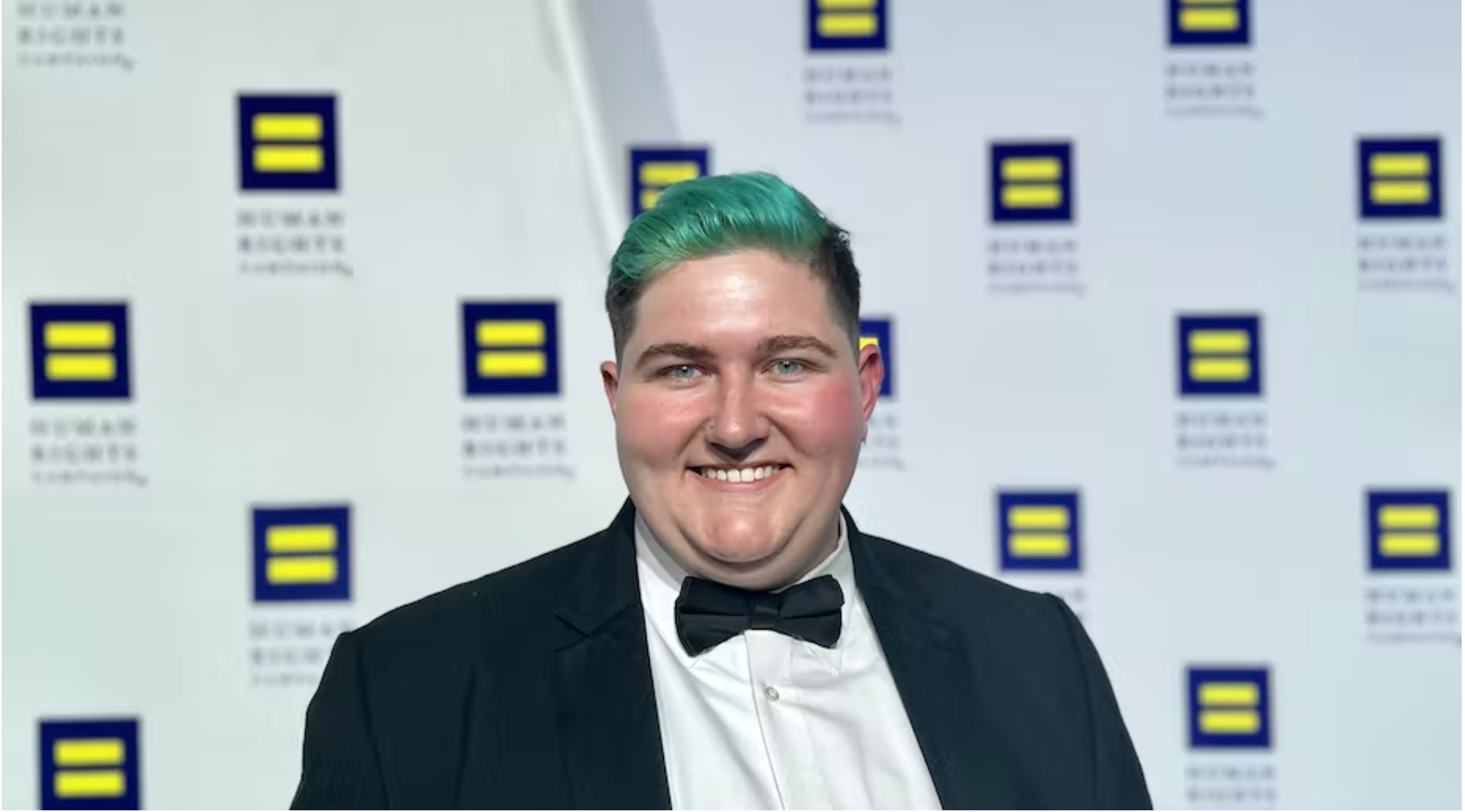
Henry Berg-Brousseau (Courtesy Human Rights Campaign)
Henry Berg-Brousseau grew up in Louisville, Kentucky, and studied history, political science and Jewish studies at George Washington University, where he was a founding member of an LGBTQ+ fraternity. He had recently gotten a major promotion at the Human Rights Campaign when he died by suicide in his Arlington, Virginia, home, on Dec. 16 at age 24. “Henry spent his life working to extend grace, compassion and understanding to everyone but especially to the vulnerable and marginalized. This grace, compassion and understanding was not always returned to him,” his mother, the Kentucky state legislator Karen Berg, wrote in a statement that criticized lawmakers who advance anti-LGBTQ views. She added, “He was doing work that was important to him to make the world a more accepting place. At 24 years old. he had finally found a community but that could not undo the brokenness that he already felt.”
Rabbi Simcha Krauss
Orthodox advocate for women’s rights
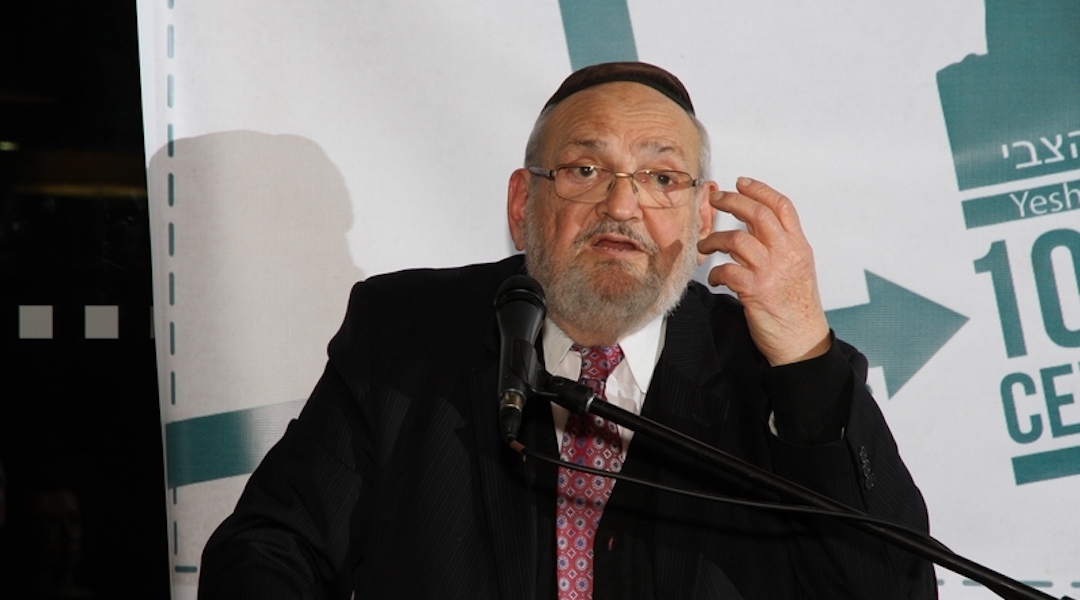
Rabbi Simcha Krauss speaks at a dinner hosted by Yeshivat Eretz HaTzvi in his honor on Feb. 5, 2014. (Courtesy Yeshivat Eretz HaTzvi)
Rabbi Simcha Krauss, a leading figure of Modern Orthodox Judaism who was a forceful advocate for women’s rights within Orthodoxy, died Jan. 20 at 85. Krauss’s efforts, which included creating a rabbinical court to support “agunot” — women whose husbands refused to divorce them — frequently earned him scorn from traditionalists within Orthodoxy. But many others saw him as a “gentle giant” who wielded his years of study and experience to fight for women’s rights in Jewish law. Krauss was born in Romania and came to the United States in 1948. Coming from a long line of rabbis, Krauss studied at Yeshiva Rabbi Chaim Berlin in Brooklyn, and later studied with the Modern Orthodox luminary Rabbi Joseph Soloveitchik. Krauss led the Young Israel of Hillcrest for 25 years. During his years in Queens, Krauss taught Talmud at Yeshiva University and began to get more involved in issues related to the role of women in Orthodoxy. He moved to Israel in 2005, and in 2014 came back to New York to found the International Beit Din, or religious court, to work on agunot cases. “Some say it is a modern revolution,” he told the Jerusalem Post. “I say that’s the way you should do it.”
Rabbi David Weiss Halivni
A survivor and scholar who teased out the many voices of the Talmud
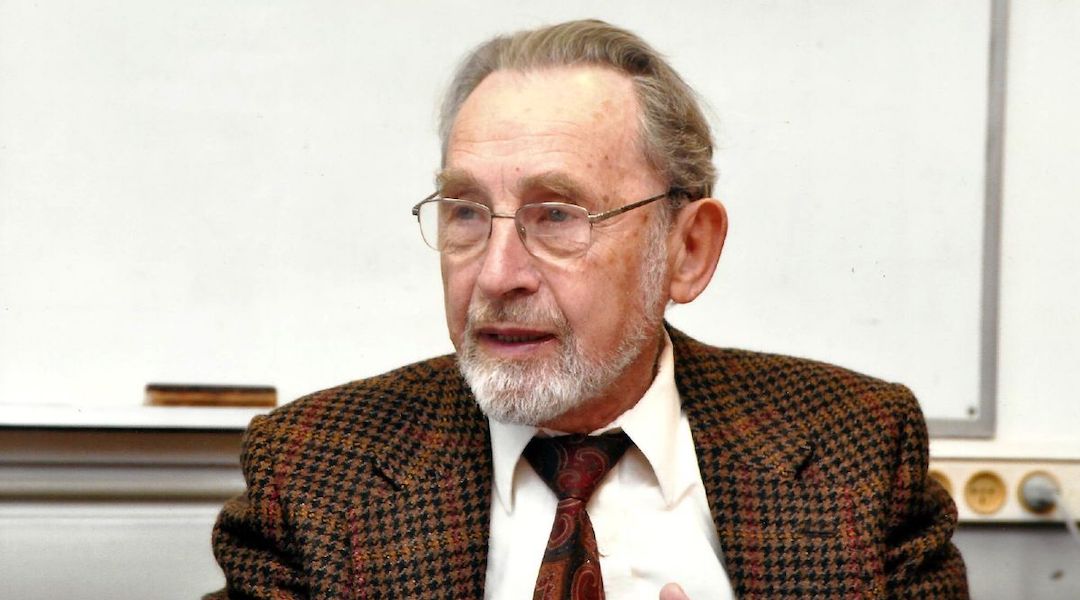
Survivor and Talmud scholar Rabbi David Weiss Halivni was associated with Columbia University for 35 years. (Chaim Meyersdorf/Wikimedia Commons)
Rabbi David Weiss Halivni, the Talmud scholar and Columbia University professor, died June 29 at age 94. A Holocaust survivor and refugee raised in Sighet, Romania, he earned his doctorate and taught for many years at the Conservative movement’s Jewish Theological Seminary in New York, until leaving the institution in 1983 over its decision to ordain women rabbis. He later became dean of the rabbinical school of the Union for Traditional Judaism, a movement created by rabbis and scholars who similarly broke with the Conservative movement. In works like his multi-volume opus “Mekorot u’Mesorot,” or “Sources and Traditions,” he galvanized the world of Talmud study by treating Jewish text as a living, mutable conversation across generations, as opposed to a static document. Halivni’s approach to learning was the “corollary to loving the text so much that you just had to understand it to its fullest, whatever tools would enable you to do so,” wrote Rabbi Ethan Tucker in an appreciation.
Moris Albahari
A remnant of a Ladino-speaking past
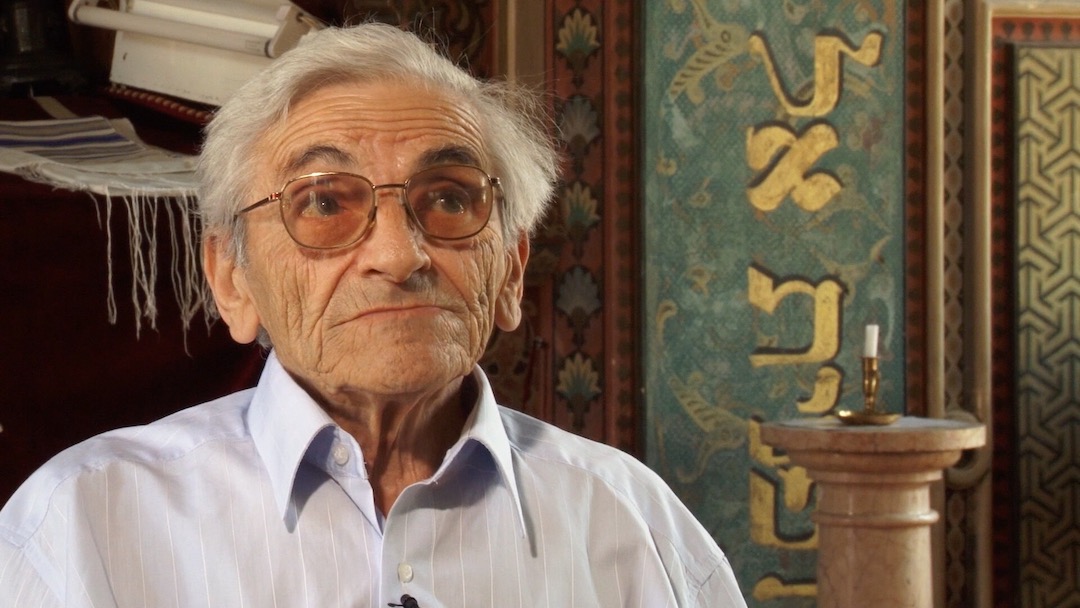
Moris Albahari, shown in a documentary about his story called “Saved by Language,” was a pillar of Sarajevo’s Jewish community. (Courtesy of Brian Kirschen)
Moris Albahari was 11 when the Ustaša, Bosnia’s Nazi collaborator force, came to deport him and his large family to Jasenovac, the country’s equivalent of Auschwitz. A former teacher working as an Ustaša guard in the town of Drvar, where the train stopped, warned Albahari’s father, David, about their destination, and David was able to help his son escape from the train. Because Moris knew Ladino, the Jewish language that is mixture of medieval Spanish, Hebrew, Aramaic, Turkish and other languages, he was able to speak with the Italian soldier who saved him. Ladino would save him several more times before the end of the war, but afterwards, with most of Sarajevo’s Jews dead or forever dispersed, he spoke the language largely at home. At one point the director of Sarajevo’s airport, Albahari was a leader within Bosnia’s Jewish community. “It is a terrible loss, especially for Sarajevok,” said Eliezer Papo, a Sarajevo-born Jew and scholar of Ladino in Israel. “We’re not speaking just in terms of prominent members of the community, we’re speaking in terms of family members.”
Rachel Brodie
A “master Jewish educator” whose influence was vast
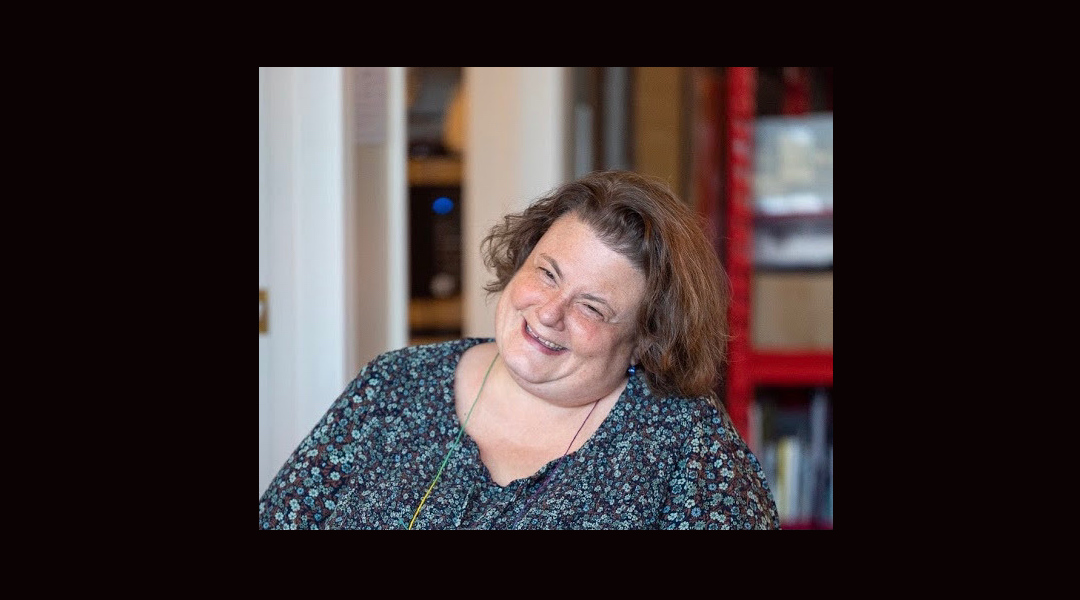
Rachel Brodie (Courtesy of J. The Jewish News of Northern California)
Rachel Brodie was unassuming and humble yet through her work as an educator had a vast influence on the Jewish community in the Bay Area of California, where she lived, and beyond. Brodie was the co-founder Jewish Milestones, an educational resource for Jewish lifecycle ceremonies that launched in 2004 as The Ritualist. She also served as “chief Jewish officer” at the Jewish community Center of San Francisco, a position created just for her, from 2011 to 2016. “To be in Rachel’s presence was to be illuminated by her wit, her laughter, and her fierce and tender heart,” wrote the founders of the Jewish Studio Project in Berkeley, where she had been a senior educator. “To learn with her was to be stimulated, delighted, and transformed.” Brodie, 55, died on April 11 after falling at her home in Berkeley.
Rabbi Steven Sager
“Leader, mentor, poet” in North Carolina and beyond
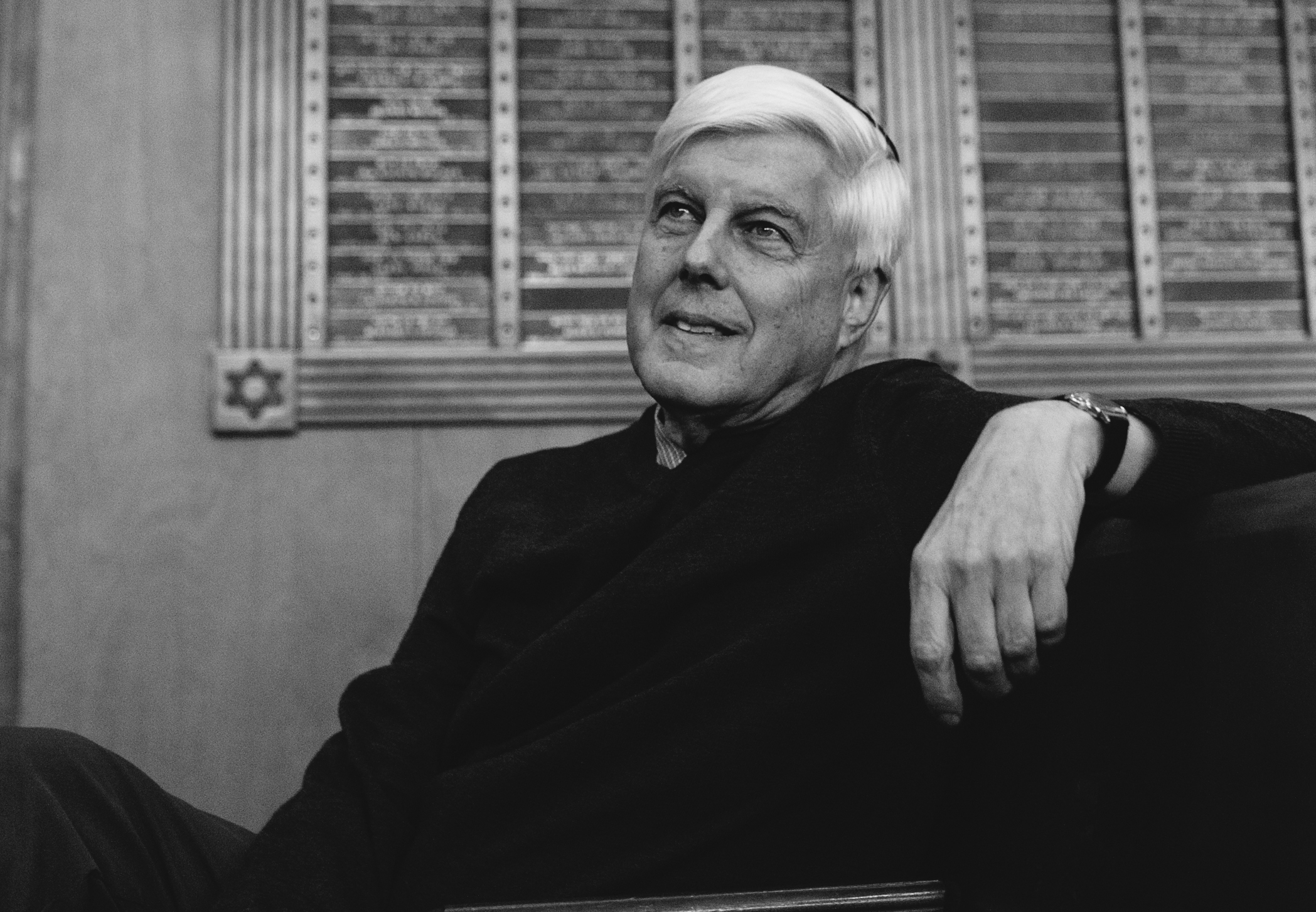
Rabbi Steven Sager at Beth El Synagogue in Durham, North Carolina, in 2017. (Courtesy Anna Carson DeWitt)
When Rabbi Steven Sager died May 15 at 71 after an extended battle with pancreatic cancer, he was mourned not only by his family and his congregants at Beth El Synagogue in Durham, North Carolina, from which he retired in 2011 after 32 years, but by a rabbinic and Hebrew poetry community spanning the globe. “Steve was a beautiful and deep human being,” the Israeli poet Rivka Miriam wrote. “I generally do not believe in translation, especially translation of poetry. It seems to me that every language has an inner secret that cannot be transposed into another vessel. Yet, when Steve translated my poems I had a different feeling — I felt he entered an inner layer, one that lies beneath any language, a layer carrying a hidden code.”
Nate Geller
Devoted to building stronger Jewish communities
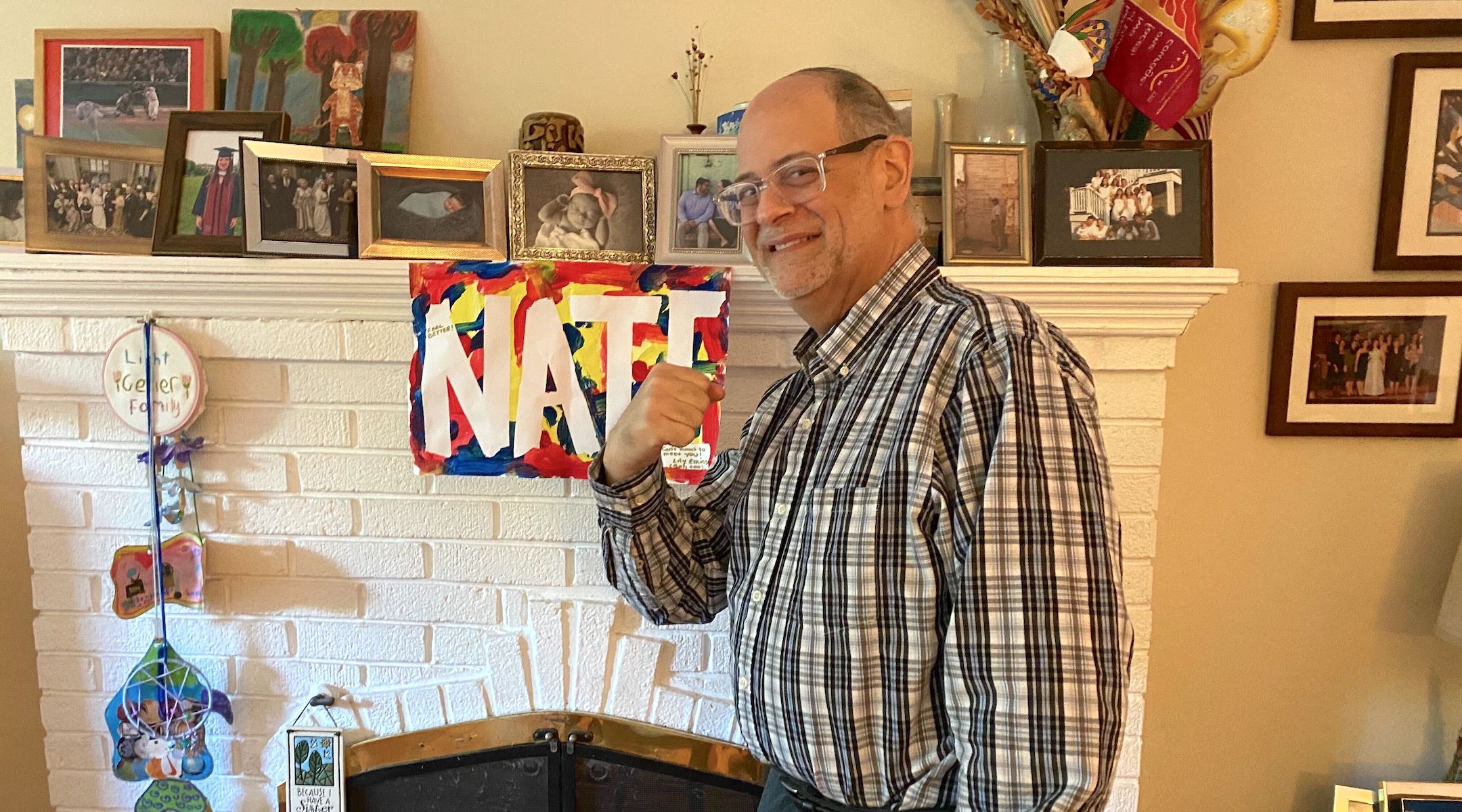
Nate Geller, at his home in Teaneck, New Jersey. A colleague’s daughter made the “Nate” sign, which he took home and hung on his mantel. (Courtesy)
Nate Geller died on Jan. 24 at age 63, after a struggle with leukemia that he faced with characteristic humility, faith and optimism. His death was a blow to his colleagues at 70 Faces Media (JTA’s parent company); to his synagogue community in Teaneck, New Jersey; and to the Jewish communal world to which he had dedicated his life since graduating from the Hornstein Program in Jewish Communal Service at Brandeis University in 1983. In the hours after his death, chat rooms and email boxes filled up with loving tributes to Nate, remarkable for their consistency: Friends and colleagues remarked on his gentleness, his passion for Jewish learning, his commitment to Israel, his willingness not just to hear but to listen when a colleague kvelled or kvetched. Most of all, they remembered his devotion to his family: his wife Lyn Light Geller, herself a gentle and passionate force among “Jewish professionals,” his grown children Aliza, Ariana and Koby, Koby’s wife Talia, and their kids, Annaelle and Judah. Said one colleague and fellow congregant, “There is an enormous Nate-shaped void in the world now.”
Hedi Fried
A voice for Holocaust remembrance in Sweden
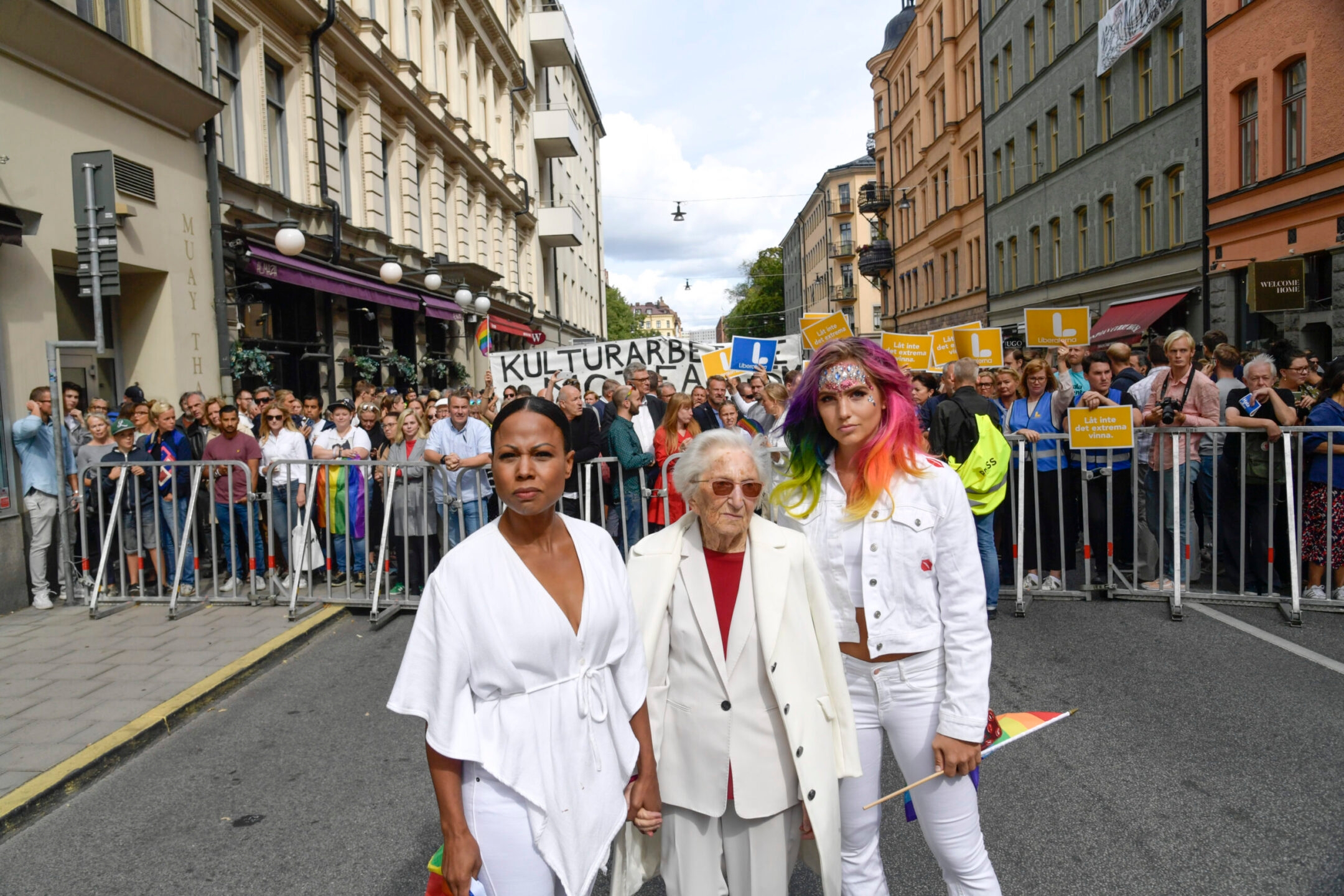
Holocaust survivor Hedi Fried stands between Sweden’s culture minister and handball player Linnea Claeson during a counterprotest against a neo-Nazi demonstration in Stockholm, Aug. 25, 2018. (Pontus Lundahl/AFP via Getty Images)
Born in 1924 in Sighet, in what was then Hungary and is now Romania, Hedi Fried survived Auschwitz and settled in Sweden, where she became a psychologist and advocate for Holocaust survivors. She created Cafe 84, a salon for survivors in Stockholm, and spoke widely about her experiences during the Holocaust, gathering some of the most common exchanges in “Questions I Am Asked About the Holocaust,” published in English in 2019. “Your solidarity was boundless and no question too difficult to answer. You were brave, generous, dedicated and extremely wise,” Christina Gamstorp, the director of Stockholm’s Jewish museum, wrote in a remembrance. “Now your voice has fallen silent but not your message. It lives on in everyone who met you, in your texts, books, films and your belief that man is still good — and that it is possible to build a society free from antisemitism and racism, which threaten our entire existence.” Fried, who had three children, died in November at 98.
Rabbi Sy Dresner
The “most arrested rabbi in America”
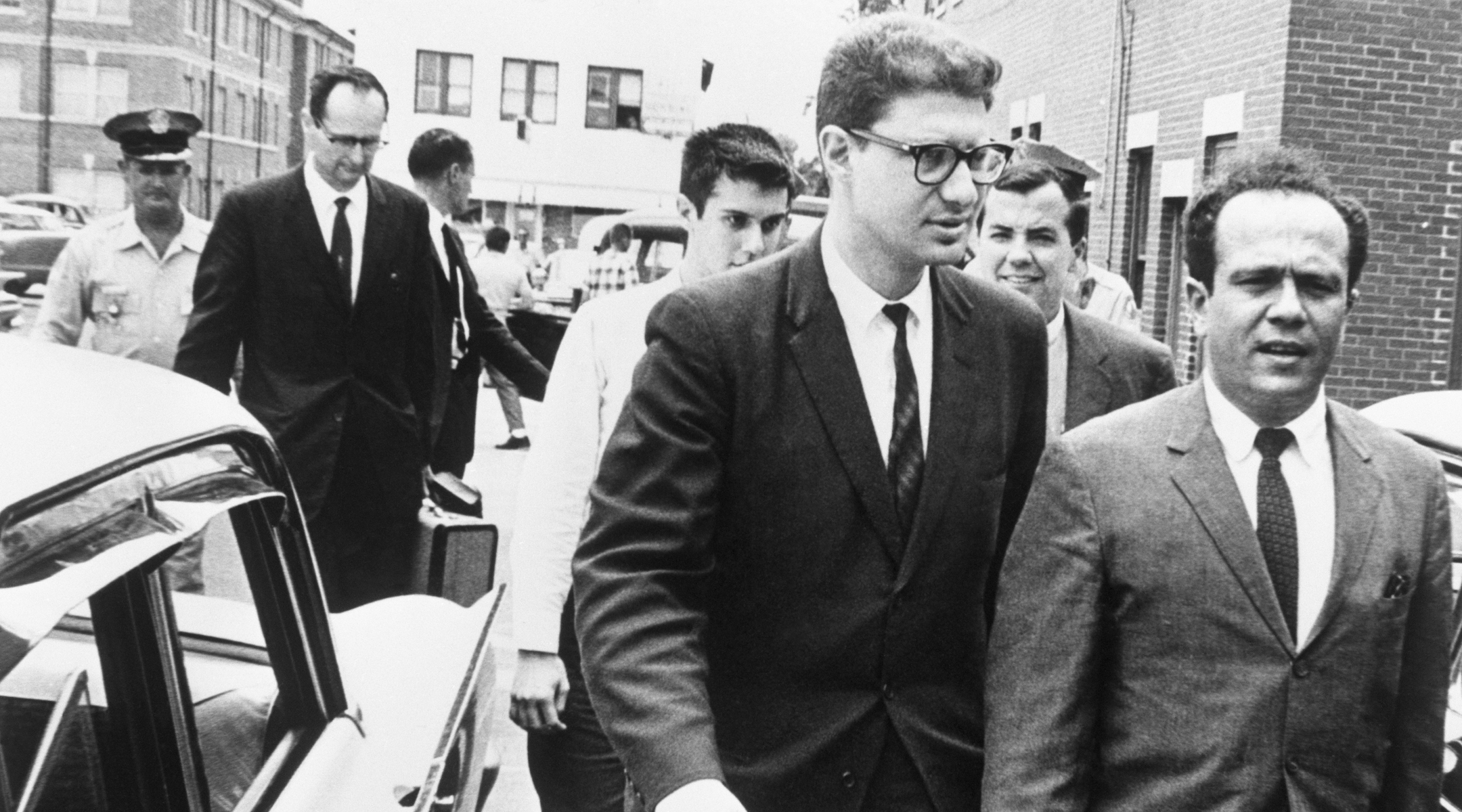
Rabbi Martin Freedman, right, and Rabbi Israel Dresner,center, are taken to the Tallahassee city building where they were charged with unlawful assembly after they and 10 other “Freedom Riders” were arrested attempting to eat at the Tallahassee airport in June 1961. (Getty Photos)
Rabbi Israel “Sy” Dresner, who demonstrated with Martin Luther King Jr. and was sometimes called the “most arrested rabbi in America,” died Jan. 13. He was 92. A Freedom Rider in the 1960s, Dresner built a career as a social justice-oriented Reform rabbi who was active in the fight against the Vietnam War and was a vocal opponent of Israel’s occupation of the West Bank. Dresner was born on the Lower East Side in 1929 to an Orthodox family and grew up in Brooklyn, where his father ran a delicatessen. He attended yeshivas as a child but went on to become a Reform rabbi after serving in the Korean War and working on a kibbutz in Israel. “We came as Jews who remember the millions of faceless people who stood quietly, watching the smoke rise from Hitler’s crematoria,” he said after an arrest in 1964 outside a segregated motel in St. Augustine, Florida. “We came because we know that, second only to silence, the greatest danger to man is loss of faith in man’s capacity to act.”
Eli Evans
‘Poet laureate of Southern Jews’
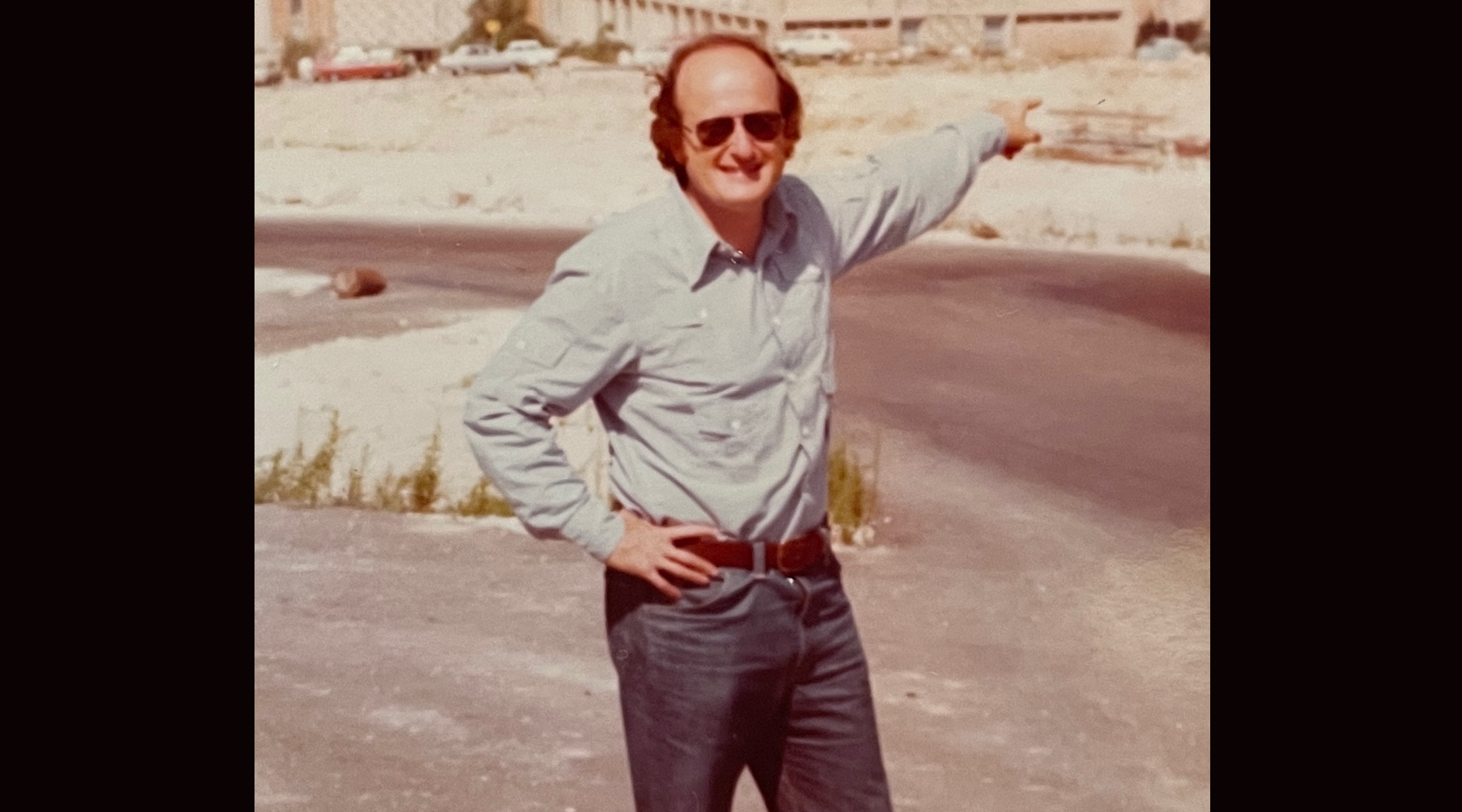
Eli Evans, seen here in a picture from a trip to Israel in the 1970s, was “equally at home in New York.” (Courtesy Josh Evans)
Born in 1936 in Durham, North Carolina, where his father would become the first Jewish mayor and his mother the founder of Hadassah’s first chapter in the South, Eli Evans remained tied to his native home despite spending his adult life in New York City, where he was a prominent grant-maker whose giving fueled the creation of “Sesame Street” in both the United States and Israel. He wrote several memoirs about Southern Jews and also included the South in his philanthropy, which he pursued at multiple foundations according to an activist philosophy that helped launch the Children’s Defense Fund, seeded the South with Black lawyers who became local civil rights leaders and built ties between Israeli and Egyptian scientists after their countries made peace in 1979. “Eli was a Southern gentleman who interacted with the Jewish establishment and strengthened American Jewish life, without losing his Southern Jewish soul,” said Brandeis University professor of American Jewish history Jonathan Sarna. “It was a privilege to have known him.” Evans died July 26 in Manhattan of complications of COVID-19, after a period of declining health.
Sheryl Grossman
A lifelong advocate for people with disabilities
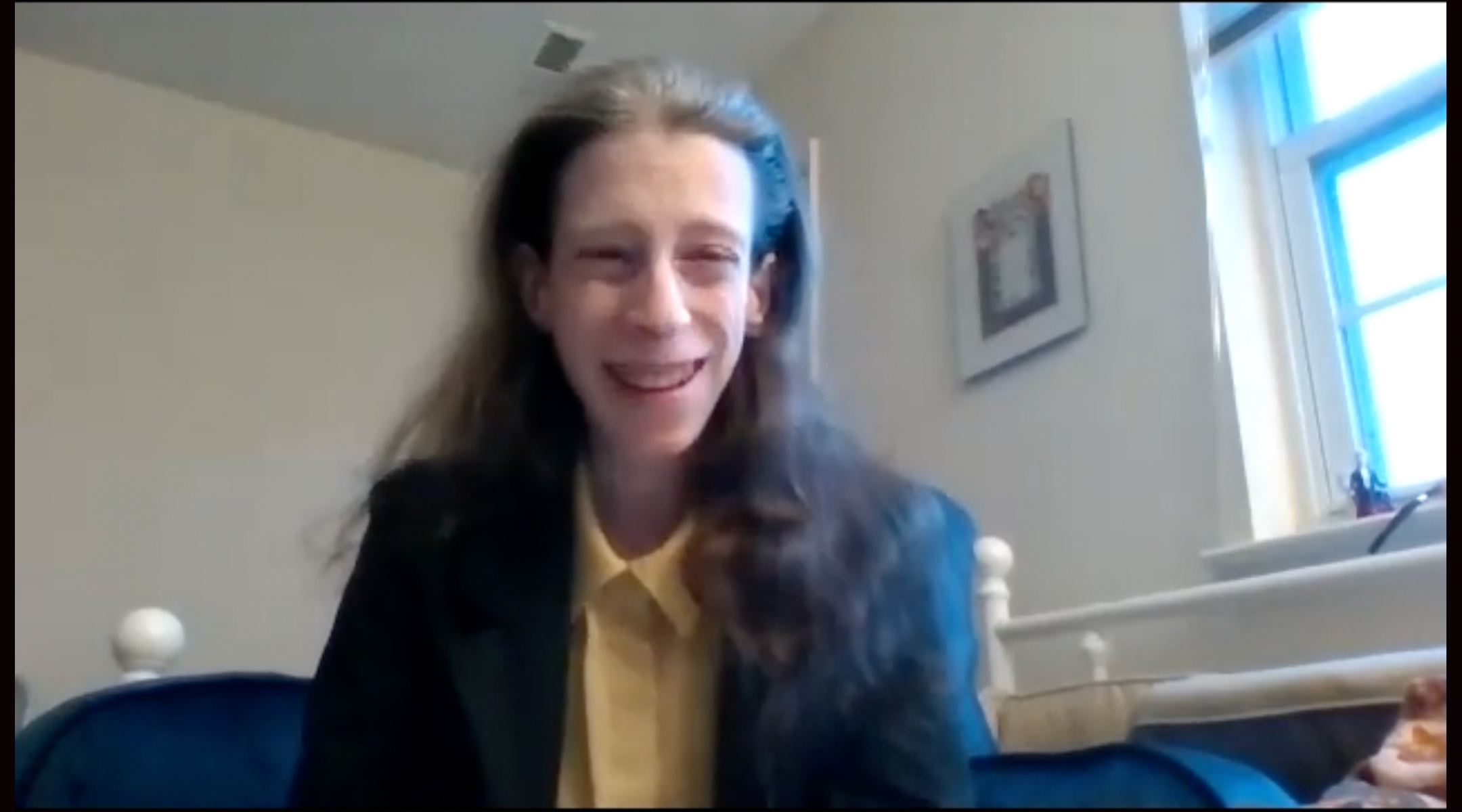
Sheryl Grossman was a Jewish disability activist. (Screenshot from 2021 JDAIM Interview Series at Towson University)
Sheryl Grossman stood small, at just 4’3″ and 48 pounds, but in the world of Jewish disability advocacy she loomed large, as both the founder of a Facebook group for people living with Bloom’s Syndrome and as a board member of Yad Hachazakah, the Jewish Disability Empowerment Center. She died March 28 at age 46, the result of a Bloom’s Syndrome-linked cancer. “I don’t think anyone will ever know just how much work Sheryl did during the pandemic to help Jewish communities support their most vulnerable neighbors who were in the hospital or isolated at home with COVID,” said Shoshana Finkel, a law student who met Grossman when she was an intern at the American Association of People with Disabilities. “She didn’t feel the need to share her accomplishments; that was never what the work was about for her.”
Dara Goldman
A professor of Spanish and Jewish studies in her prime
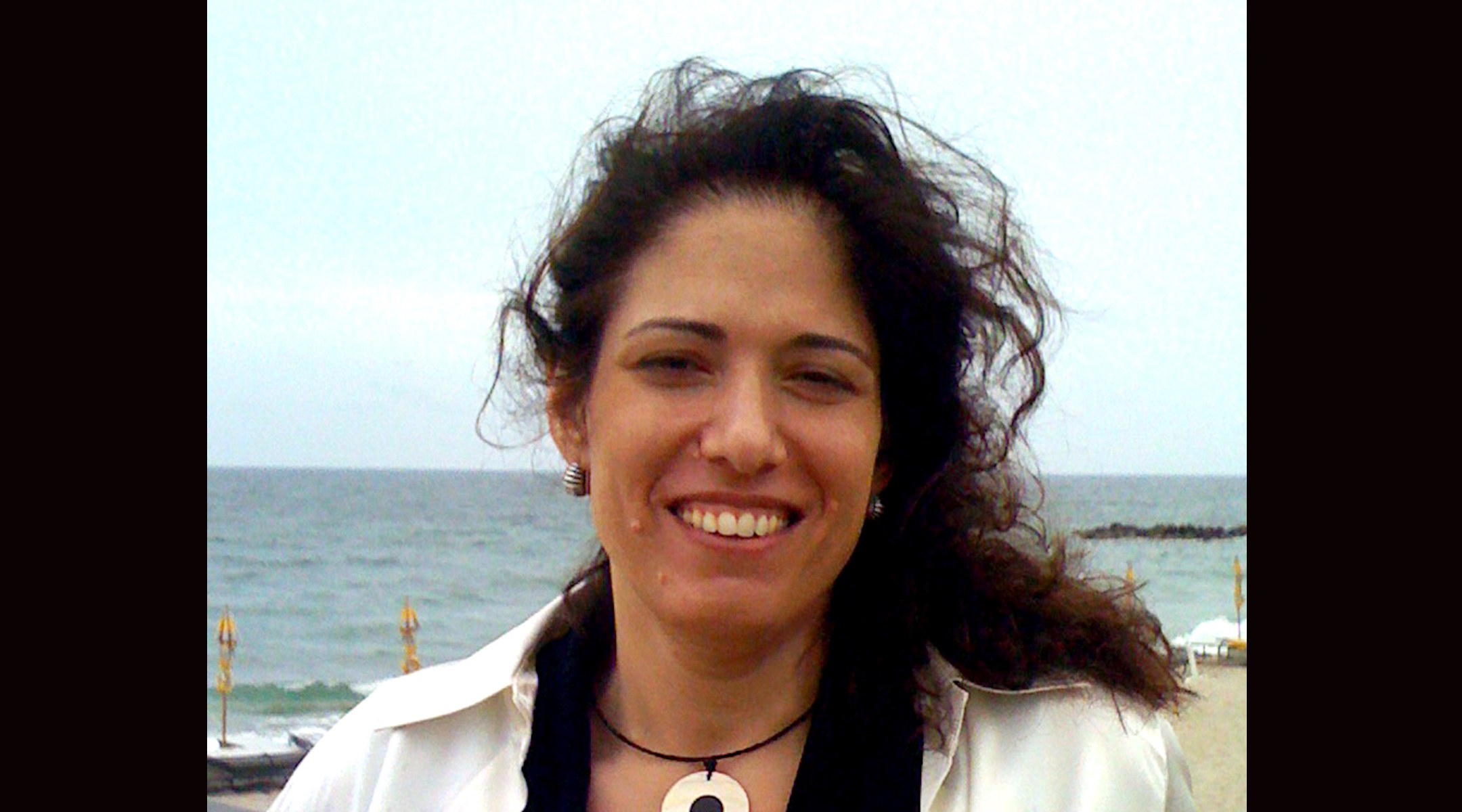
Dara Goldman was a professor of Spanish and Jewish studies at the University of Illinois. (Courtesy U of I)
Dara Goldman was preparing for graduation at the University of Illinois, where she was a professor of Spanish and chair of the Program in Jewish Culture and Society, and for the American Jewish Historical Society conference, when she died May 13 of a heart attack. She was 51. A graduate of Columbia and Emory universities, Goldman produced scholarship so diverse that she was affiliated with eight units within the University of Illinois; most recently, she was researching Jewish cultural production in Cuba, where she brought resources for the Jewish community during her research trips, and co-edited a volume on 21st-century Jewish writing. “With her characteristic wit, she would often joke that she was a Jewish woman who took a wrong turn at diaspora,” said a remembrance published by the university. “But jokes aside, she could be at the same time a Jewish woman from New Jersey and an adopted daughter of Puerto Rico and Cuba, two cultures that she knew intimately and loved very deeply. … The echoes of her inimitable, hearty laughter will resonate within our halls for a long time.”
Yaakov Shalev
A beloved family man whose story was Israel’s
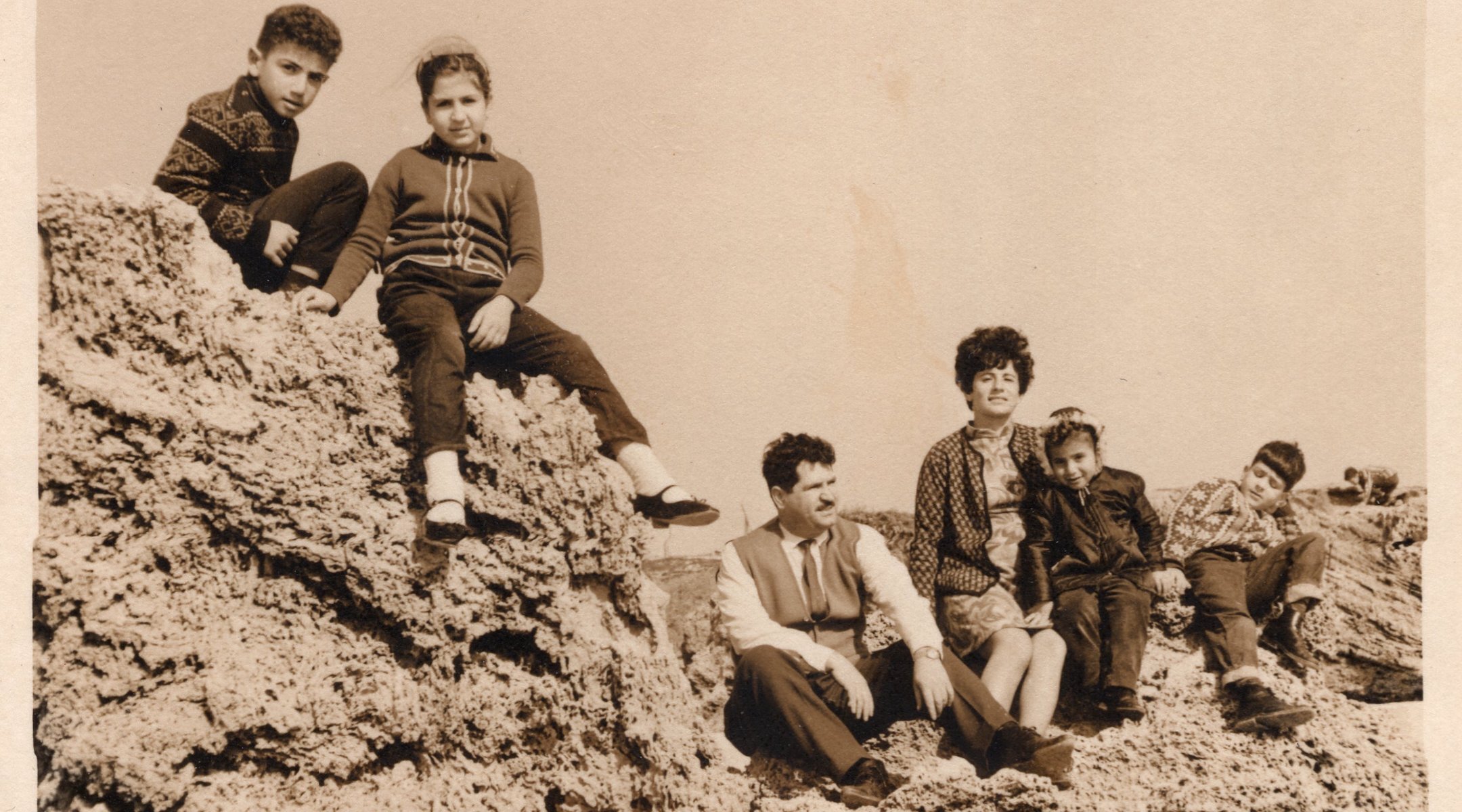
Yaakov Shalev, seated third from right, helped organize Iraqi Jews’ exodus to Israel. (Courtesy Asaf Elia-Shalev)
“When I arrived for a visit with family in Israel in my early twenties, my septum piercing outraged nearly everyone at our Shabbat morning gathering. Even my younger cousins badgered me to remove it. It took my elderly grandfather, Yaakov Shalev, to quiet everyone down and declare that I am his same beloved grandson, with or without the piercing.
“Calm, open-minded, steadfast, Saba Yaakov, as we called him, passed away peacefully in February at age 92 in Holon, with his five children at his side. He spent his last few hours listening to the melodies of his youth in Baghdad, the music of giants such as Umm Kulthum, Mohammed Abdel Wahab, and Farid al-Atrash.
“Saba Yaakov helped organize the exodus of Iraqi Jewry to Israel in 1950 and then enlisted in the Israeli military as an airplane mechanic. He taught himself how to build houses and became a successful contractor in the 1960s. But he soon decided the stress was too much and opened a shop in south Tel Aviv where he fabricated canvases for Israeli artists and framed their paintings. He kept the shop running for more than 40 years, going to work every day until he was in his eighties.” — Asaf Elia-Shalev, JTA reporter
Trude Feldman
A journalist who specialized in Yom Kippur interviews
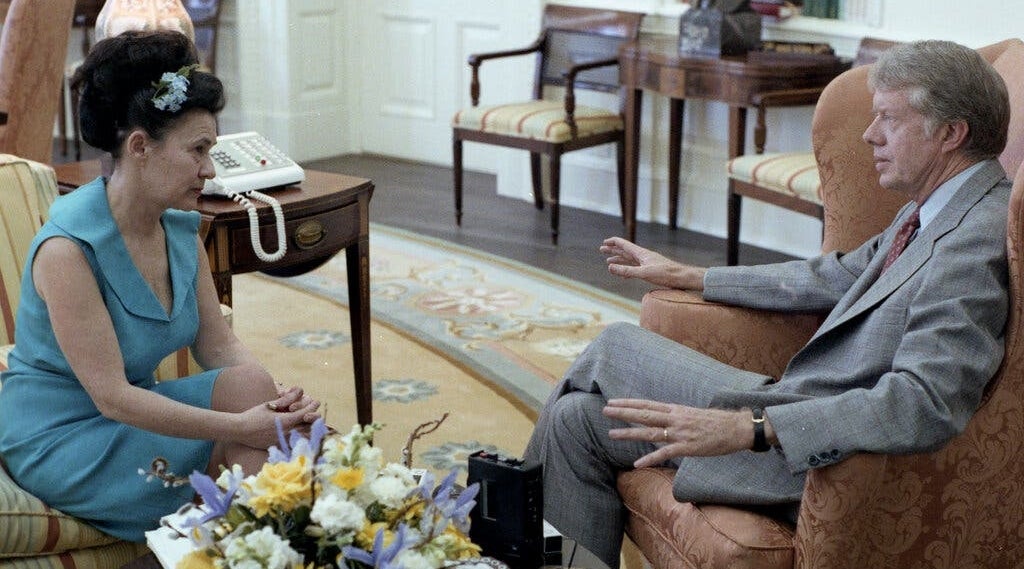
Trude Feldman interviews Jimmy Carter in the White House in 1978. (Jimmy Carter Presidential Library)
The daughter of a rabbinical family, Trude Feldman launched her career covering the 1961 trial of Nazi mass murderer Adolf Eichmann in Jerusalem, where she put her training as a Hebrew teacher to use by teaching the language to the Nazi’s lawyer. (She also taught Hebrew to famed converts Sammy Davis Jr. and Elizabeth Taylor, and to Paul Newman on the set of “Exodus.”) But it was in her coverage of American presidents that Feldman truly made her mark, becoming famous for scoring presidential exit interviews and Yom Kippur interviews, which she would pitch as an opportunity for redemption. That’s what got her the first interview with Bill Clinton after he copped in 1998 to yes, having sex with that woman. The mainstream media mocked her for her softballs — “Saturday Night Live” once did so in a sketch — but those close to her understood their value. “The joke, however, was on everyone else,” her nephew, Rabbi Daniel Feldman, wrote in a remembrance. “Paired with her signature persistence, her style more often elicited not puff but profundity, more sincerity than sugar. The unique access she earned — baffling to some, understood to the astute, acknowledged by all — yielded memorable results.”
Harlene Winnick Appelman
A revolutionary leader in Jewish education
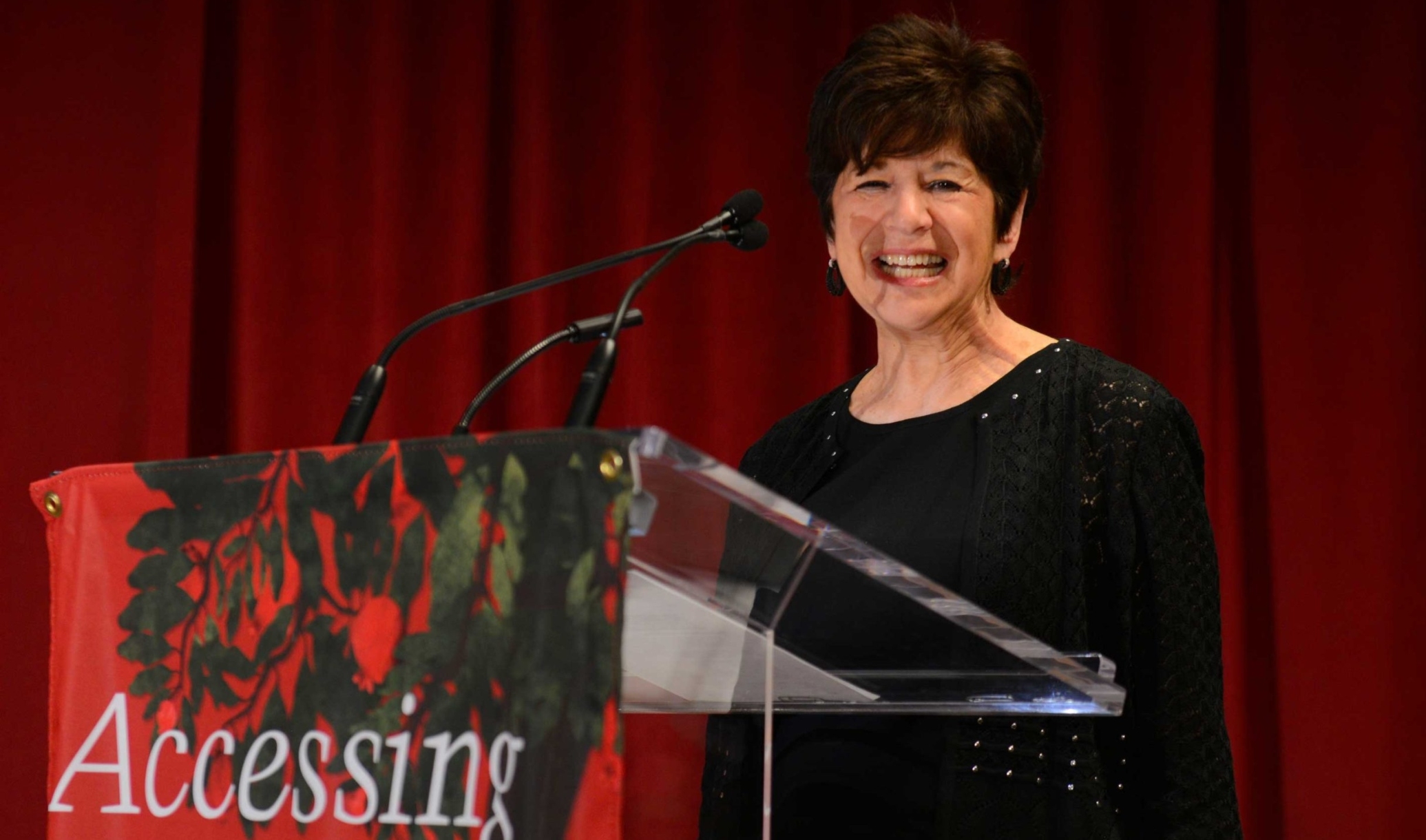
Harlene Winnick Appelman in an undated photo provided by the Covenant Foundation.
Born in upstate New York, Harlene Appelman’s career in Jewish education took off in 1982 when she became the director of family life education at Congregation Shaarey Zedek in Southfield, Michigan, a Detroit suburb. There, she pioneered interactive Jewish learning, bringing children out of dry frontal settings into a more tactile experience of Judaism. After joining the board of the Covenant Foundation, which funds and promotes Jewish education, in 1994, she became its director in 2005 and held that role until 2021, allowing her to influence a generation of Jewish educators. Many of them mourned her death at 75 on Aug. 18; the cause was cancer. “I am one of an entire congregation of Jewish educational leaders who Harlene mentored, supported, prodded and constructively critiqued, promoted, and made feel special,” wrote Rabbi Shira Koch Epstein, in an online remembrance. “I hope that in her memory, I will find ever new ways to help more Jewish rabbis and educators feel seen, heard, capable, and motivated.” This month, the Covenant Foundation initiated a new prize, in Jewish family education, in Appelman’s honor.
Tom Tugend
An indefatigable journalist
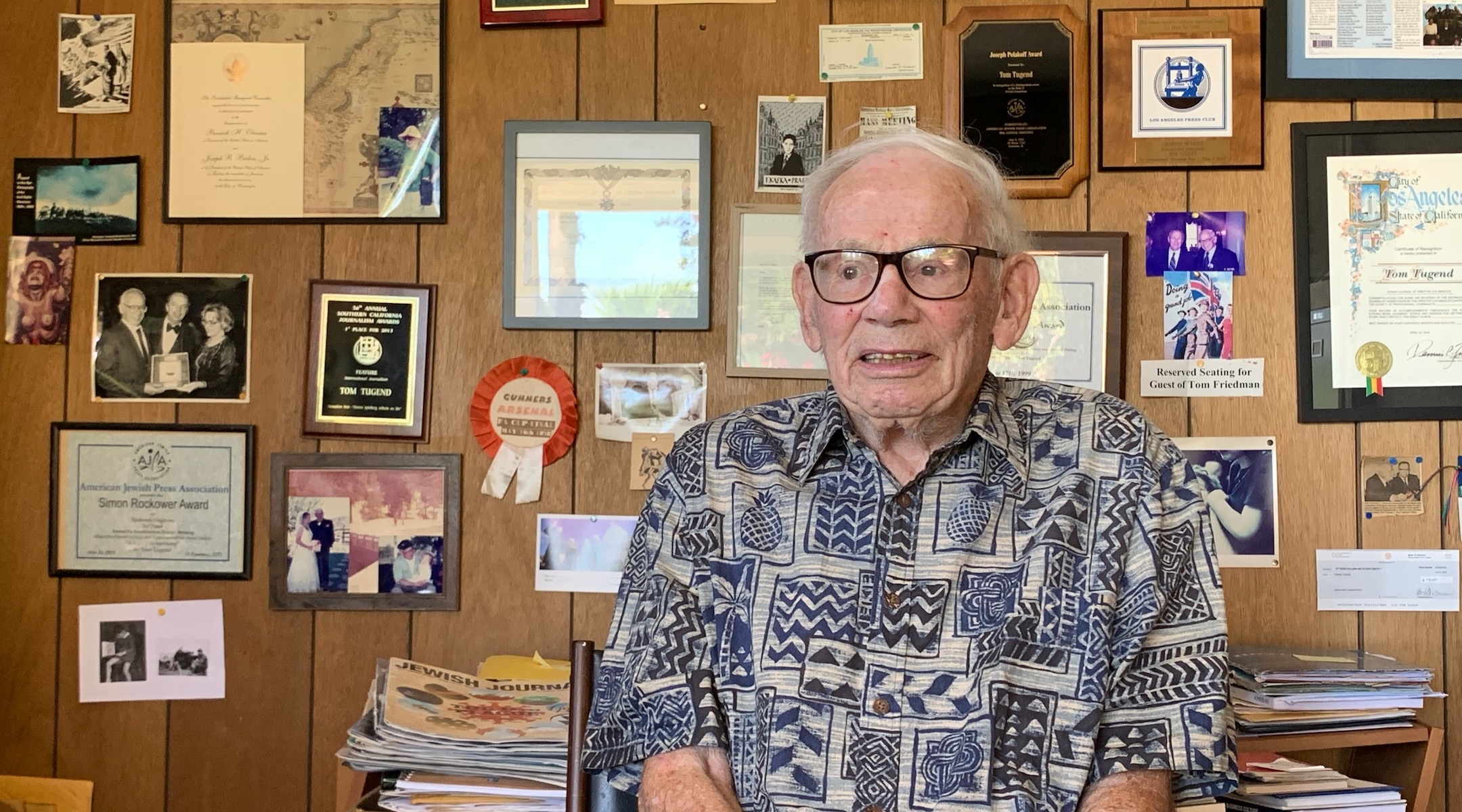
Tom Tugend in his Los Angeles home, Aug. 3, 2021. (Jacob Gurvis)
Tom Tugend was 13 when he and his family left their home in Berlin in 1939. He was 97 when he died Dec. 7 in Los Angeles, where he had lived for most of his life. In the intervening decades, he fought in the U.S. Army and the Israel Defense Forces; covered Jewish news for a wide array of publications, including JTA; and enjoyed 66 years of marriage during which he and his wife raised three daughters. “His authenticity came through to anyone who knew him,” said one of them, the journalist Alina Tugend. “He was a hero to many people.”
Judah Samet
A two-time survivor of antisemitic terror
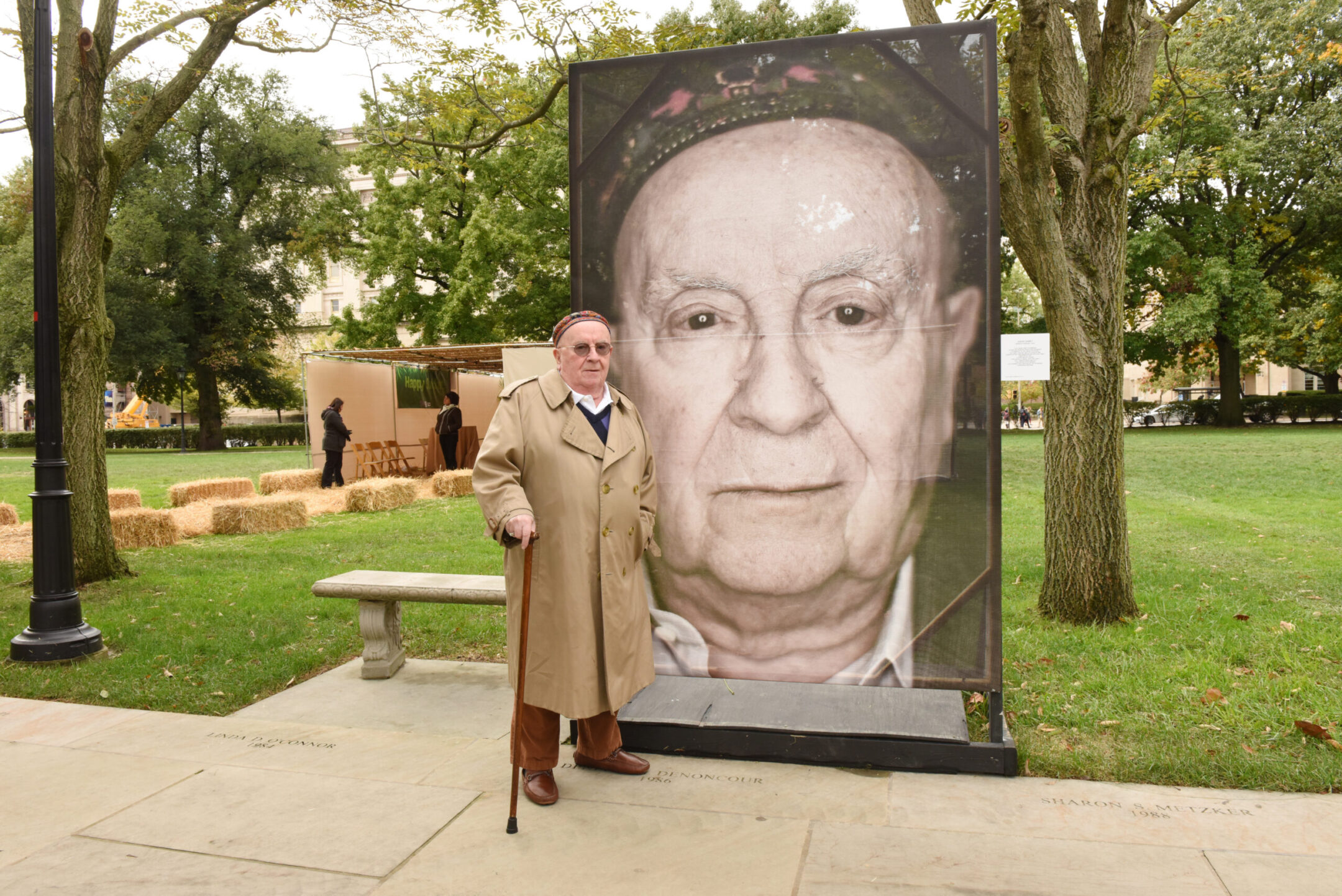
Judah Samet stands next to his portrait, part of Luigi Toscano’s “Lest We Forget” project at the University of Pittsburgh in 2019. (Photo by Hector Corante, courtesy of Holocaust Center of Pittsburgh)
Judah Samet became a national face of Pittsburgh’s 2018 Tree of Life synagogue shooting because he survived: He had been running late that day, so was not inside the building when 11 of his fellow congregants were murdered. Months later, he was President Donald Trump’s guest to the State of the Union address. The experience was both very different Samet’s childhood in Hungary, where he was born in February 1938, and in some ways similar. As a young child, Samet was forced by the Nazis from his home and shipped with his family first to a labor camp in Austria and then to the Bergen-Belsen concentration camp. After a stop in Israel, he moved to Pittsburgh in the 1950s, ultimately joining his father-in-law’s jewelry business there and remaining a committed community member until his death at 84 on Sept. 27.
JTA has documented Jewish history in real-time for over a century. Keep our journalism strong by joining us in supporting independent, award-winning reporting.
